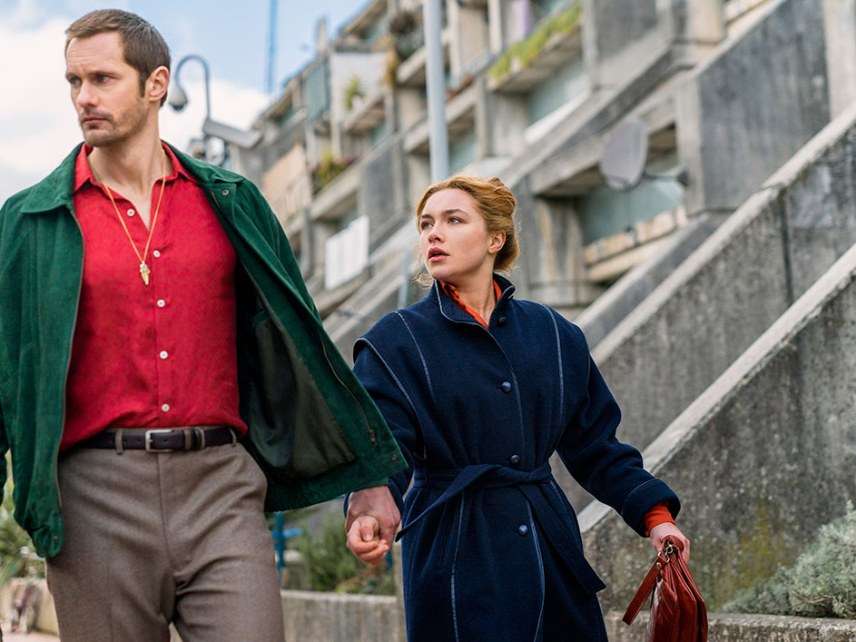Thriller The Little Drummer Girl Finally Gets the Miniseries Treatment It Needed
AMC turns le Carre's spy novel into six-hour epic.
The Little Drummer Girl. AMC. Monday, November 19, 9 p.m.

Thirty-four years ago, New York Times film critic Vincent Canby accurately referred to a film adaptation of John le Carre's spy novel The Little Drummer Girl as "overstuffed" with characters, plot, and action and wondered idly if it "could have been done successfully as a television mini-series."
Canby, alas, is gone, but we do finally have an answer for him: a qualified yes. AMC's new six-hour version of The Little Drummer Girl is superior to the film in every way, even if it still has a few shortcomings.
From the same producers who in 2016 adapted The Night Manager, le Carre's edgy tale of international arms trafficking, The Little Drummer Girl captures the mutual remorselessness of terrorists and the forces that oppose them; the through-the-looking-glass logic with which they hunt one another; and their disregard for what they regard as collateral damage, the civilians caught in the middle.
Set in the late 1970s when Palestinian terrorism in Europe was at its height (the massacre of the Israeli Olympic team in Munich was not a scar but an open wound), Drummer Girl follows an Israeli Mossad team that's trying to infiltrate—and rub out—a hermetic and highly effective cell of Palestinian bombers.
Because the cell covers its tracks by using fellow-traveling European women to deliver the bombs, Mossad decides to recruit somebody of the same ilk as an infiltrator. They settle on a bohemian British actress named Charlie (Florence Pugh, star of the 2016 British film Lady MacBeth), who at first seems an unlikely recruiting target: Her party chatter (she brags she's never married because "I refused to be a slave to patriarchy) and her fashion trappings (a volume of Regis Debray always in hand, if rarely opened) seem to mark her politics as irretrievably leftist.
Actually, though, Charlie is already playing a part, hiding her thoroughly middle-class upbringing to pose as a refugee from a broken proletarian home to give herself street cred in the progressive theatrical troupe where she's found work. Confronted, she just shrugs that she's an actress: "I take whatever role is on offer."
Her ego—and a bit of yearning for Becker (Alexander Skarsgård, True Blood), one of the Mossad men—convinces Charlie to take on the infiltration gig, which is presented to her as if it's mostly a grown-up version of a little girl's dress-up game. But when she's unexpectedly told to cross a border alone with a load of plastic explosives concealed in the roof of her car, it becomes difficult to sort out role from reality.
The theme of innocents caught up in spy games is always a good hook, but hardly novel; it goes back at least to Hitchcock's The 39 Steps. But Drummer Girl gives it an identity-politics twist. The very things that make her attractive to each side—that she's neither Palestinian nor Jewish—also make her an object of suspicion, as well as wholly dispensable.
"We can't count on gentile loyalty," grumbles one senior Israeli official to the suggestively named Kurtz (Michael Shannon, Waco), the Mossad officer in charge of the operation. "If you want to catch a lion," replies Kurtz, "a toy goat won't play." There's no need to add what eventually happens to the goat.
What sank the film version of Drummer Girl was trying to cram the immense density of le Carre's novel—full, as all his works are, of plots and counter-plots, hooks and feints, and some of the most detailed characterizations in modern literature—into two hours. The result was less a movie than an extended highlight trailer.
The six-hour miniseries allows more time to roll out all the novel's quirky is-she-or-isn't-she counterintelligence tableux in their full, squirmy glory. Director Chan-wook Park (The Handmaiden) makes use of every extra moment, lingering over the fine points of spy work like pocket litter (local coins, matchbook covers, and other mini-detritus that lend a spy authenticity) and sharply cross-cutting between Charlie's preparation sessions and her real work in the field. The existential dread of detection is practically a character in Drummer Girl.
Where Park is less skilled is in his handling of Drummer Girl's erotic elements. The sexual chemistry of fear and danger is supposed to play a big role in Charlie's recruitment, first by Mossad and later by the Palestinians. But those scenes mostly fizzle than sizzle.
Part of it is not Park's fault; Drummer Girl is a co-production between AMC and the BBC, which doesn't share its partner's tolerance of (maybe "affection for" is a better phrase) bare breasts and naughty-talk, and the cuts where AMC has removed stuff are often jolting. Even in the most generous appraisal, though, Charlie's enthusiasm for tumbles with the taciturn and cruel-minded men she encounters on each side seem less like authentic sexual frenzies than a propaganda short titled Brit Girls Are Easy. What do you suppose Mary Poppins was really doing behind that umbrella?


Show Comments (7)